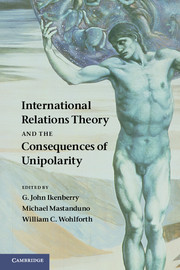Book contents
- Frontmatter
- Contents
- Figures
- Tables
- Notes on the contributors
- Notes on the editors
- 1 Introduction: unipolarity, state behavior, and systemic consequences
- 2 Unipolarity, status competition, and great power war
- 3 Legitimacy, hypocrisy, and the social structure of unipolarity: why being a unipole isn't all it's cracked up to be
- 4 Alliances in a unipolar world
- 5 System maker and privilege taker: US power and the international political economy
- 6 Free hand abroad, divide and rule at home
- 7 The liberal sources of American unipolarity
- 8 Unipolarity: a structural perspective
- 9 Unipolarity and nuclear weapons
- 10 From unipolarity to multipolarity: transition in sight?
- 11 Sell unipolarity? The future of an overvalued concept
- Index
- References
4 - Alliances in a unipolar world
Published online by Cambridge University Press: 05 June 2012
- Frontmatter
- Contents
- Figures
- Tables
- Notes on the contributors
- Notes on the editors
- 1 Introduction: unipolarity, state behavior, and systemic consequences
- 2 Unipolarity, status competition, and great power war
- 3 Legitimacy, hypocrisy, and the social structure of unipolarity: why being a unipole isn't all it's cracked up to be
- 4 Alliances in a unipolar world
- 5 System maker and privilege taker: US power and the international political economy
- 6 Free hand abroad, divide and rule at home
- 7 The liberal sources of American unipolarity
- 8 Unipolarity: a structural perspective
- 9 Unipolarity and nuclear weapons
- 10 From unipolarity to multipolarity: transition in sight?
- 11 Sell unipolarity? The future of an overvalued concept
- Index
- References
Summary
An alliance (or alignment) is a formal (or informal) commitment for security cooperation between two or more states, intended to augment each member's power, security, and/or influence. Although the precise arrangements embodied in different alliances vary enormously, the essential element in a meaningful alliance is a commitment for mutual support against some external actor(s). Because these arrangements affect both the capabilities that national leaders can expect to draw upon and the opposition they must prepare to face, alliances are always a key feature of the international landscape and should play an important role in the calculations of any foreign policy decision maker.
The advent of unipolarity has had profound effects on the nature of contemporary alliances. A preponderance of power in the hands of a single state – in this case, the United States – had never before occurred in the modern era. Because the gross distribution of capabilities helps identify both possible sources of threat and the potential allies that might be recruited to deal with them, the condition of unipolarity inevitably shapes the alliance choices that are available to different states. A unipolar distribution of capabilities will also influence bargaining within contemporary alliances, based on the relative strength of different actors and the alliance options available to each.
- Type
- Chapter
- Information
- Publisher: Cambridge University PressPrint publication year: 2011
References
- 7
- Cited by

